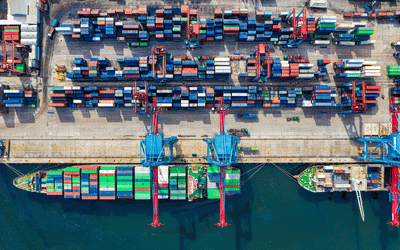Update 2025: Stricter regulations and expanded dual-use goods list
In December 2020, China passed a new export control law that has been in force since December 1, 2020. The law regulates the export of dual-use goods, military goods, and other controlled items from China. German companies that do business with China should be aware of the regulations and adapt their compliance processes accordingly.Current developments: Contrary to earlier assessments, it is becoming apparent that the impact of the Chinese export control law is much more far-reaching than initially assumed. The new provisions not only affect companies based in China, but also have a direct impact on German exporters through extraterritorial application and re-export controls.
In this article, you will learn which new provisions have been in force since 2025, how the impact on German companies has changed, and what specific steps are now necessary.
Who is affected?
The Chinese Export Control Law basically affects all companies that export controlled goods from China. These include:
Directly affected companies:
- Companies based in China (including foreign subsidiaries)
- Exporters of controlled goods from China
- Companies in the special administrative regions of Hong Kong and Macau
Indirectly affected companies:
- German companies that integrate Chinese components into their products
- Companies with joint ventures or cooperations in China
- Distributors of Chinese technologies in Germany
Important note: The extraterritorial application of the law has not yet been fully clarified. German companies should closely monitor developments.
Which goods are controlled?
The Chinese Export Control Law covers various categories of goods. The following table provides an overview of the most important categories of controlled goods:
| Goods category | Legal basis | Examples | Special features |
|---|---|---|---|
| Dual-use goods | Export Control Act Art. 2, National Control List | Chemicals, electronic components, certain software, precision machinery | Can be used for both civilian and military purposes |
| Military goods | Export Control Act Art. 2, Military Goods List | Weapons, military equipment, armament technologies | Strict control, usually export ban |
| Nuclear goods | Export Control Act Art. 2, Atomic Energy Act | Nuclear material, reactor components, enrichment technology | Highest security level |
| Rare earths | Export Control Act Art. 2, Raw Materials Ordinances | Neodymium, dysprosium, terbium, europium | Strategically important raw materials |
| Biotechnology | Export Control Act Art. 2 | Certain microorganisms, genetic equipment, vaccines | Growing importance |
| Cyber technologies | Export Control Act Art. 2, Cybersecurity Act | Encryption software, surveillance technology | National security |
| Catch-all goods | Export Control Act, Art. 11 | Goods not listed for sensitive end uses | Case-by-case assessment |
Important notes on the table:
Catch-all clause: Even goods that are not explicitly listed may be subject to licensing if they are to be used for purposes that could jeopardize China’s national security.Dynamic lists: The specific control lists are updated regularly. Companies should consult the current versions issued by the Chinese authorities.
Legal basis:
- Main law: Export Control Law of the People’s Republic of China (in force since December 1, 2020)
- Supplementary regulations and lists are issued by MOFCOM and other authorities
Required documents
Various documents are required for the export of controlled goods from China:
Basic documents
-
-
- Export license from the Chinese Ministry of Commerce (MOFCOM)
- Proof of end use (end-use certificate)
- Detailed product description
- Information about the end user
-
Additional requirements
-
-
- For sensitive goods: Extended documentation on the planned use
- Proof of compliance with Chinese safety regulations
- Possibly additional official approvals
-
Practical tip: Requirements may vary depending on the type of goods and country of destination. It is advisable to clarify this with the Chinese authorities at an early stage.
Consequences of violations
Violations of the Chinese Export Control Law can have serious consequences:
Administrative penalties
-
-
- Fines of up to ten times the value of the goods
- Confiscation of the goods concerned
- Revocation of export licenses
-
Criminal prosecution
-
-
- In the case of serious violations: prison sentences for responsible persons
- Companies can be prosecuted
-
Enforcement instruments
China has developed various instruments to enforce its export control regulations:
-
-
- “Unreliable Entity List”: Companies that violate Chinese interests can be placed on this list, which makes it considerably more difficult to do business in China.
- Retaliatory measures: China can take action against companies that implement or support foreign sanctions against Chinese companies.
- Group-wide impact: Sanctions can affect all affiliated companies within a group, even those outside China.
- Further sanctions: Exclusion from public contracts and restrictions on business activities in China.
-
Recommendations for companies
Immediate measures
-
-
- Take stock of the situation
- Check all China-related business for potential impact
- Analyze supply chains and identify critical components
- Review existing contracts for any necessary adjustments
- Seek legal advice
- Consult specialized law firms
- Clarify extraterritorial application
- Assess potential legal conflicts
- Adapt compliance system
- Revise internal guidelines
- Train employees
- Improve documentation processes
- Take stock of the situation
-
Long-term strategies
-
-
- Diversify supply chains
- Identify alternative suppliers outside China
- Build up strategic inventories
- Risk assessment for critical components
- Establish a monitoring system
- Regular monitoring of changes in legislation
- Build up China expertise within the company
- Participate in industry associations and information exchange
- Proactive communication
- Intensify dialogue with Chinese business partners
- Create transparency regarding compliance requirements
- Early coordination with authorities
- Diversify supply chains
-
Conclusion
The Chinese Export Control Law presents German companies with new challenges. A proactive approach and early adaptation of compliance systems are crucial to minimizing risks and preserving business opportunities.
Important note: This article provides a general overview. Companies should always seek specialized legal advice for specific cases.



